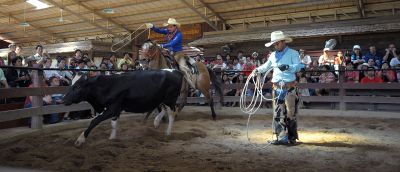Thai cowboys saddle up to celebrate Wild West

Your support helps us to tell the story
From reproductive rights to climate change to Big Tech, The Independent is on the ground when the story is developing. Whether it's investigating the financials of Elon Musk's pro-Trump PAC or producing our latest documentary, 'The A Word', which shines a light on the American women fighting for reproductive rights, we know how important it is to parse out the facts from the messaging.
At such a critical moment in US history, we need reporters on the ground. Your donation allows us to keep sending journalists to speak to both sides of the story.
The Independent is trusted by Americans across the entire political spectrum. And unlike many other quality news outlets, we choose not to lock Americans out of our reporting and analysis with paywalls. We believe quality journalism should be available to everyone, paid for by those who can afford it.
Your support makes all the difference.They sport leather chaps and wide-brimmed hats, and dance to country music performed on a stage filled with line dancers in a celebration of the spirit of America's Wild West.
But these cowboys are partying a long way from the United States. In Thailand's farming heartland, thousands of families have flocked to a festival to honour a sub-culture they have adopted as their own.
Thailand's northeast Isaan region has developed its own cowboy scene over the past four decades, ever since US troops spent time in the country during the Vietnam War and left an indelible cultural stamp, say locals.
"You can say it comes from the Vietnam War, but most people these days find out about (cowboys) from the films," says Surasak Sitawanamas, owner of Cowboy City resort where the festival was held last month.
Wearing a fur pelt over his left shoulder on top of a sheepskin coat, Surasak says he had dreamed of setting up the 65-room cowboy-themed hotel ever since he was a child.
"I've loved cowboys since I was little. My schoolfriends and I would watch a lot of Westerns and I decided that one day I would open my own cowboy resort," says Surasak, citing US actor John Wayne as his hero.
While some attending the festival - and others like it - wear fancy dress for the occasion, many say they work as cattle herders and that for them, being a cowboy is a way of life.
Partygoer Wilai Chomchono arrives wearing a purple cowboy shirt decorated with cattle skulls and a neck scarf, his beard plaited and carrying three leather holsters on his belt.
"I was one of the first cowboys in this area, I have been living with horses for all my life, this is why I am a cowboy, I always wear this," he says.
As the strains of singer John Denver play in the background, Wilai watches his two sons practise their lasso skills and offer horse rides to revellers at the hoedown.
Ranch hands sit chatting around small fires in the festival grounds, as pigs turn on spits for dinner.
On stage a band with a banjo player strums country songs and theme tunes from Western television classics such as Bonanza and Maverick.
Several miles (kilometres) away, far from the grounds of Cowboy City's festival, another glimpse of America's southern culture is being beamed by satellite to a television at a streetside food stall.
Men eating spicy Thai soup on their lunchbreak stare transfixed at the latest rounds of a rodeo competition taking place in Texas.
"The landscape of this region is ripe for cowboys because we're on a plateau," says festival promoter Boonsong Singha, who also publishes a magazine about Thai cowboy culture.
"And the outfit is good for farming," he adds. "The hat shields you from sun, and the boots and jeans protect you in the fields."
Some revellers even opt for Native American costume instead of cowboy gear.
A government official calling himself Mr Oh wears a huge feathered headdress with a fringed suede tunic and rows of beads around his neck.
He says it is his tenth visit to a cowboy festival and he is selling memorabilia at one of the festival stalls.
"After I came the first time I realised that I really love it. What makes it attractive to me is the freedom. Cowboys and Indians have a free life," said Oh.
ct/dk/lb
Join our commenting forum
Join thought-provoking conversations, follow other Independent readers and see their replies
Comments